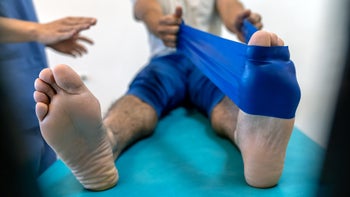
What Causes Muscle Twitching (Fasciculations)?
Key takeaways:
Most common causes of muscle twitching are not harmful. They include things like fatigue, dehydration, electrolyte imbalances, or caffeine use.
Muscle twitching can sometimes be a symptom of a more serious neurological condition. But these conditions also cause muscle weakness, tremors, or difficulty controlling movements.
If you are experiencing frequent muscle twitching, there are some lifestyle changes you can make to see if they help.

Most people have experienced the symptom of muscle twitching in their eye, arm, or leg. Muscle twitches (also called fasciculations) are a common symptom. And they affect as many as 75% of healthy people.
There are several reasons it can happen. But most of them are not harmful or anything to worry about. It is rarer for muscle twitching to be a sign of something more serious. Let’s take a look at what causes muscle twitching, what you can do about it, and when you should seek care.
What is a muscle twitch?
Muscle twitches are fast contractions of muscle fibers that happen without warning. You can feel them more easily than you can see them. Sometimes you may notice a small fluttering in the affected muscle. Twitches are not strong enough to move a limb or joint, and they are generally not painful.
Search and compare options
The difference between twitches, cramps, and tremors
Muscle twitches are different from muscle cramps or tremors.
Muscle cramps generally involve the entire muscle rather than a few fibers. They are also typically stronger, more intense, and more likely to be painful. In a muscle cramp, the entire muscle will tighten for a few seconds up to a few minutes. Instead, people won’t see a subtle movement like they can with twitches. And they can often feel a hard knot. Many people know cramps as a pain in the calf muscle that wakes them up at night.
Tremors are more like twitches. This is because they are small, uncontrollable, and painless. But they look and feel different than twitches. They are repetitive movements that cause visible shaking of the body part involved. Many people are familiar with this sensation in their hands when they feel anxious, hungry, or overly caffeinated.
Common causes of muscle twitching
Muscle twitching is a common symptom that is usually not caused by anything serious. Most of the time, the exact cause cannot be pinpointed. But muscle twitches are often caused by:
Electrolyte imbalances: Muscle function and contraction depends on a healthy range of different electrolytes — like sodium, magnesium, potassium, and calcium — in the blood. When they are out of balance, it may lead to muscle twitching.
Dehydration: This can often lead to small changes in electrolyte levels as well. Both excessive sweating and illnesses that cause vomiting and diarrhea can lead to dehydration.
Exercise: Following intense exercise, your body releases waste products from your cells. Some of these are called “free radicals.” And experts think that they can cause twitches. They are thought to irritate your nerve endings and cause them to fire. This in turn allows your muscle fibers to contract, resulting in a twitch.
Substance use: Muscle twitching has been linked to caffeine, alcohol, and cigarette use. But there is no strong evidence to suggest this is true.
Fatigue or stress: Stress can affect the body in many different ways. Many cases of muscle twitching have been connected to lack of sleep, stress, or anxiety.
Steroid use: Both steroid use and discontinuation of steroid use have been reported to cause muscle twitching. But the exact relationship is still unclear.
Despite all these possible factors of muscle twitching, it is hard to know for sure exactly what causes it. This may lead people to wonder ‘if I can’t find the cause, how do I know it’s not serious?’
Researchers actually asked the same question. They conducted one study of healthy adults who experienced frequent muscle twitching. In the follow-up — which was up to 30 years after the study — no serious illness or neurological condition ever developed.
Medical providers often reassure people who experience muscle twitching that it is nothing to worry about. This is because when muscle twitching is caused by a serious or underlying medical issue, it typically comes with other more severe symptoms.
Here are some conditions that are known to cause muscle twitching, among other symptoms:
Insecticide toxicity: When these chemicals are eaten, inhaled, or absorbed through the skin, they create noticeable symptoms of toxicity. These include vomiting, sweating, coughing, or difficulty breathing.
Amyotrophic lateral sclerosis (ALS, also known as Lou Gehrig’s disease): This is a rare neurological condition that leads to gradual weakness. If this is the cause of your twitching, other symptoms will be apparent like muscle loss or weakness.
Post-polio syndrome: Although polio has been wiped out, there are many people who have recovered from it. So some people may still develop post-polio syndrome. This causes significant weakness, general fatigue, muscle pain, and twitching.
Spinal muscular atrophy (SMA): Children with this rare disease may have muscle twitching — classically of the tongue. Children with SMA also have noticeable weakness and lack of muscle tone.
When should I worry about muscle twitching?
If you are experiencing muscle twitching, you may be wondering if you should see a medical provider. Here are some simple lifestyle changes you may want to try first. While there is no clear evidence to show that these tips can treat twitching, they are safe and potentially beneficial:
Make sure you are well hydrated.
Lower your caffeine intake.
Cut back on cigarettes or alcohol.
Take steps to improve your sleep.
Try some stress-reduction techniques.
If you don’t notice any improvement or feel your symptoms worsening, book an appointment with your medical provider. They can perform a physical exam or even run some simple tests to make sure you have nothing to worry about.
Still, many people will question whether their muscle twitching is an early sign of another more serious condition, like ALS. Other symptoms you might see in early ALS include:
Tight or stiff muscles
Weakness that affects daily activities, like the ability to dress yourself, write, or walk properly
Slurred speech
Difficulty chewing or swallowing
People also commonly worry that twitching could be a sign of Parkinson’s disease (PD). But PD usually causes tremors rather than twitching. People will often notice this tremor in their hands and wrists. It is particularly noticeable when resting. Other PD symptoms can include:
Muscles that feel unusually stiff
Difficulty starting movements, like standing up from a chair
Trouble walking or taking normal-size steps, such as shuffling their feet
Trouble swallowing
Changes in memory or thinking
If you experience any of these symptoms, talk to your provider about any concerns you have.
The bottom line
If you notice new muscle twitching, know that is a common symptom experienced by most healthy adults. Although, this doesn’t make it any less bothersome. Consider looking at a list of commonly mentioned causes. And also see if there are simple changes you can make that may help. This may include getting a good night’s rest, lowering your caffeine intake, or working some light exercise and hydration into your day. But if you are worried or notice new symptoms, don’t wait to make an appointment to talk to your healthcare provider.
Why trust our experts?


References
Blexrud, M. D., et al. (1993). Long-term follow-up of 121 patients with benign fasciculations. Annals of Neurology.
Kalmar, J. M., et al. (1999). Effects of caffeine on neuromuscular function. Journal of Applied Physiology.
Mitsikostas, D. D., et. al. (1998). Fasciculation potentials in healthy people. Muscle & Nerve.
National Institute of Neurologic Disorders and Stroke. (2021). Spinal muscular atrophy fact sheet.
Orsini, M., et al. (2011). Benign fasciculations and corticosteroid use: Possible association? An update. Neurology International.
Shing, S. L. H., et al. (2019). Post-polio syndrome: More than just a lower motor neuron disease. Frontiers in Neurology.

























